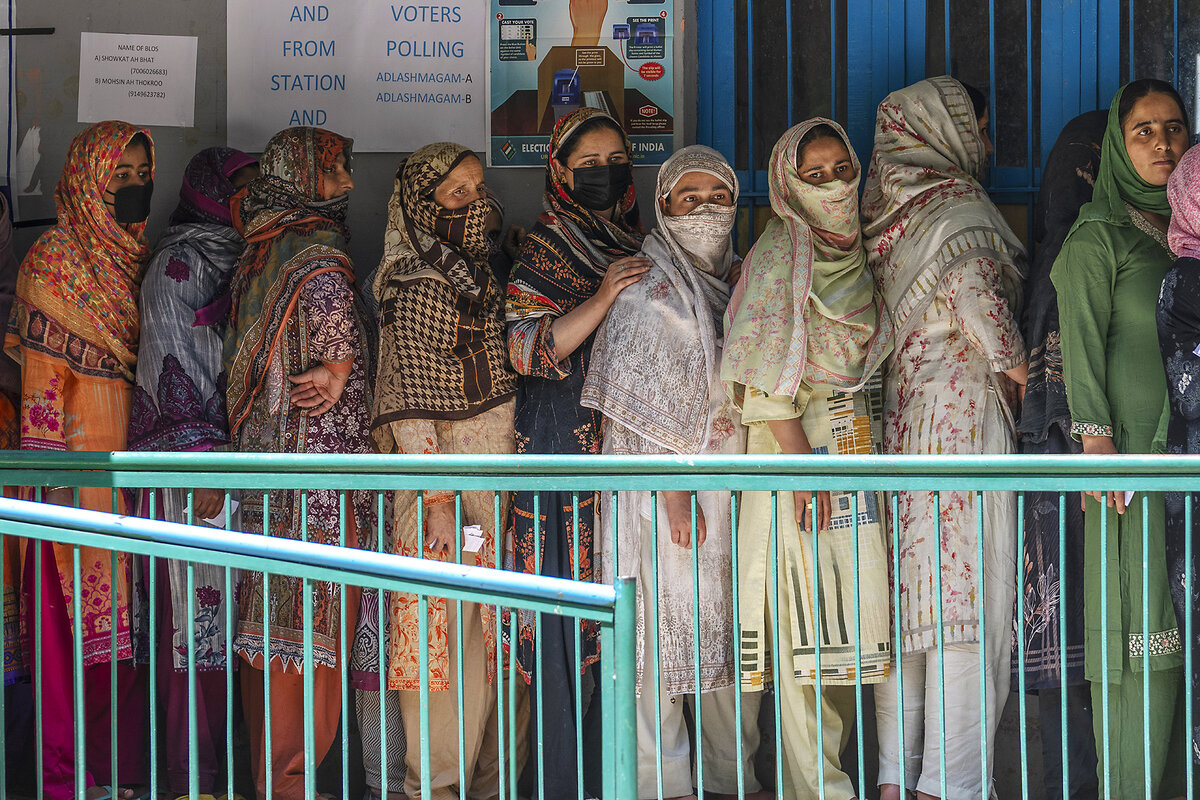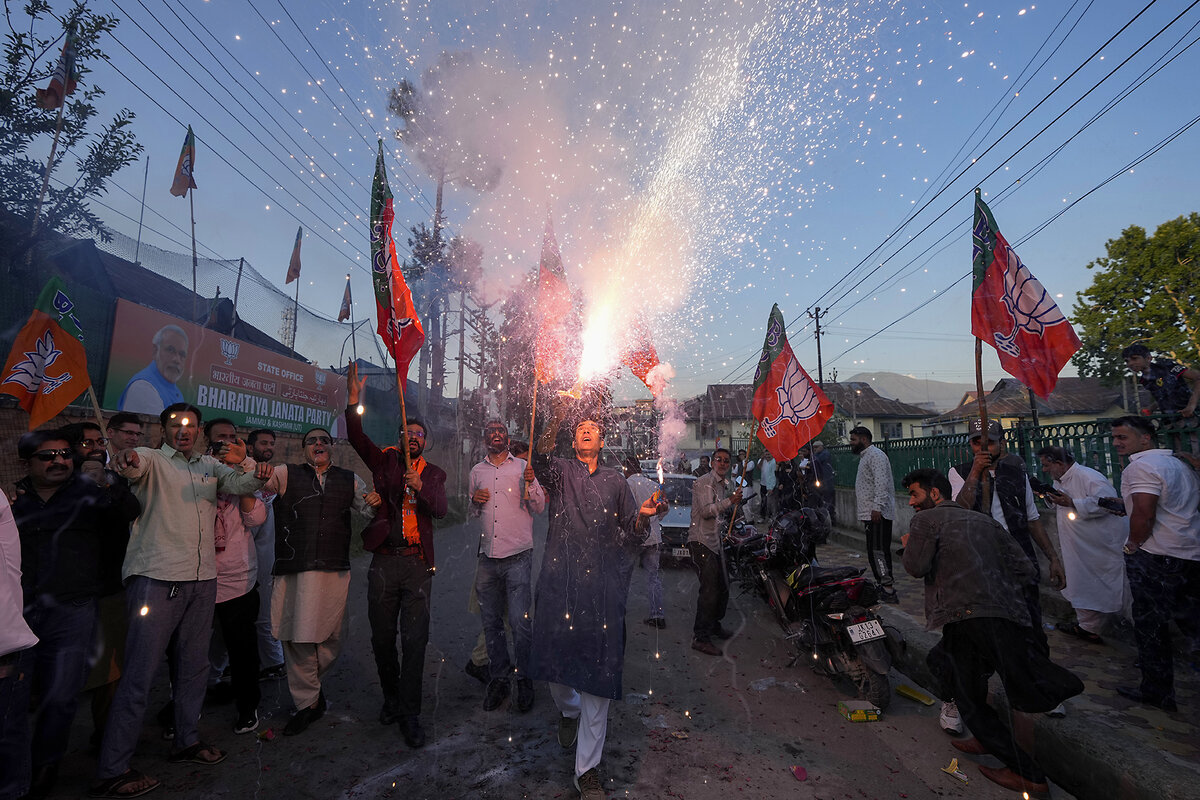After tumultuous India election, Modi softens toward Kashmir
| Srinagar, India
The political landscape of Jammu and Kashmir remains challenging terrain for Prime Minister Narendra Modi in his third term.
The Himalayan region has been marred by decades of violence and political disempowerment – including the Modi government’s 2019 decision to unilaterally downgrade Jammu and Kashmir from a state to union territory, ruled directly by Delhi, and revoke the region’s limited autonomy.
But last week, when Mr. Modi visited Kashmir for the first time since India’s general election, he announced that preparations for long-awaited regional Assembly elections had begun, and vowed to restore Jammu and Kashmir’s statehood.
Why We Wrote This
Indian Prime Minister Narendra Modi appears to be easing up on Kashmir – a shift that could restore a sense of political agency to millions in the beleaguered region, and buttress peace efforts.
“You have kept the flag of democracy aloft, and I have come to thank you,” he told a gathering in a Srinagar auditorium, referring to the high voter turnout in recent elections.
The trip marked a dramatic shift in tone toward Kashmir, and follows other promising developments, including the first Pakistani delegation to visit the valley in five years. Although experts are divided on whether Mr. Modi will follow through on his promises, these changes are fostering hope for some semblance of political agency and stability in Kashmir.
Noor Ahmad Baba, a political analyst, credits the ruling party’s election losses, particularly in Jammu and Kashmir, for the shift.
“In Kashmir, the kind of narratives that [India’s central government] wanted to sell post-2019 have not been able to make an impact on the ground,” he says. “The political forces that the government supported have been completely rejected by the people.”
India’s new political dynamics
The Modi-led Bharatiya Janata Party (BJP) lost its absolute majority in Parliament in the recent elections. In Jammu and Kashmir, the BJP won two seats but received only 24.3% of votes – about half its share in the previous election. It did not field any candidates in the Kashmir Valley’s three parliamentary constituencies. There, the Jammu and Kashmir National Conference (JKNC) won two seats – beating out BJP proxies and other regional candidates – and former lawmaker Abdul Rashid Sheikh secured the third from prison.
Mr. Sheikh’s victory is seen as a protest against the mass crackdown on political dissent in Kashmir, in which thousands were imprisoned and press freedoms curtailed. In the past, BJP leaders have also attempted to discredit local political parties, accusing them of corruption and nepotism.
But since the recent elections, Tanvir Sadiq, chief spokesperson of the JKNC, says the BJP appears to be easing up on this practice. And implementing future crackdowns “will be even more challenging now, given the presence of an alliance government” in Delhi, he adds.
This all bodes well for Kashmiris’ hope for greater autonomy.
“An election, which previously seemed highly unlikely, now appears on the horizon,” says Mr. Sadiq.
Indeed, analysts say the election results reveal the limits of ruling by fear, and highlight the necessity for political engagement and dialogue.
Still, without a clear date set, the elections aren’t guaranteed.
Path to peace?
The central government’s current position, caught between maintaining control and addressing demands for democratic processes, is a tenuous balancing act.
Radha Kumar, author of “The Republic Relearnt: Renewing Indian Democracy (1947-2024),” says that after revoking Kashmir’s limited autonomy in 2019 and launching a widespread crackdown without any consultation, the government thought it would create an “obedient populace.” Instead, it created a security state mentality ruled by fear.
The risk of loosening the reins is the resurgence of separatist violence, which has declined in recent years.
“They are in a dilemma,” says Dr. Kumar, who was part of a government-appointed interlocutors panel on Kashmir in 2010. “You can’t indefinitely prolong the security state, so it’s between the devil and the deep sea.”
For Lieutenant General (retired) Syed Ata Hasnain, a former corps commander in Kashmir, this security situation is essential to understanding the BJP’s motives in the valley. The new Modi government is not mellowing its stance on local separatists or “radical ideologues,” he explains in an email, but recalibrating its approach to the region in the hopes of one day entering Kashmir’s political mainstream.
“It will aim to form a government on its own strength,” he says. “For that, a calibrated political approach will be needed without giving away anything in terms of security.”
Retired Air Vice Marshal Kapil Kak says it’s too early to tell if Mr. Modi will adopt a more moderate stance on Kashmir. But for now, “if the state elections are held, it is reasonable to believe that the ruling dispensation will be trounced in the valley,” and, to some extent, Jammu, he says.
That’s a reality Mr. Modi will need to weigh when considering a third-term policy on Kashmir.
For Sudheendra Kulkarni, a former adviser to the prime minister during the 1999-2004 BJP government, the choice is clear.
“The people of Kashmir have felt that they have been disenfranchised. That they have no vote, they have no voice and they are being governed from Delhi,” he says. “Now, unless the people participate in the peace process, there will be no genuine peace.”








